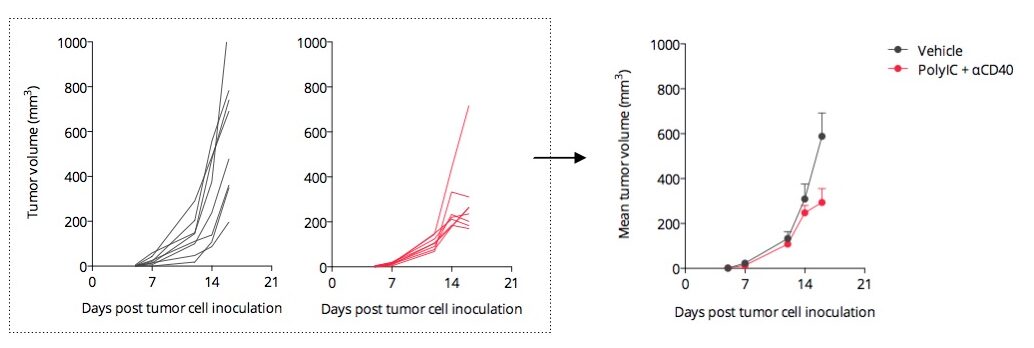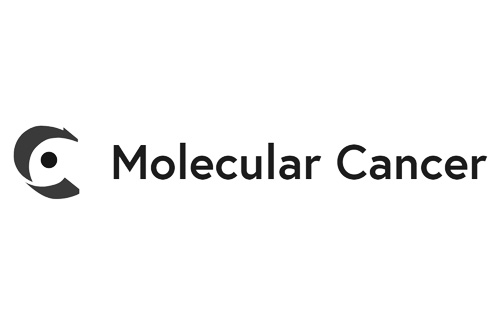-
- Model features: intact immune system, validated & robust immunization protocol
- Tumor cell line: Breast Cancer (4T1, EMT6), Colon Cancer (CT26, MC38), Gliobastoma (GL261), Lung Cancer (LLC1), Pancreatic cancer (Pan02), Renal Cancer (Renca), Sarcoma (MCA205)
- Tumor implantation: subcutaneous or orthotopic
- Protocol: co-administration of adjuvants poly(I:C) (TLR3 ligand) and agonistic anti-CD40 antibody
- Readouts: body weight, tumor size, survival

TLR3 ligation/CD40 activation immunization in CT26 tumor model
Poly(I:C)/anti-CD40 antibody immunization delays tumor growth in CT26 tumor-bearing mice. Mice are challenged with CT26 tumor cells and exposed to Poly(I:C) and agonist anti-CD40 antibody, and tumor growth is monitored overtime. Poly(I:C)/anti-CD40 antibody treatment triggers an anti-tumor effect when compared to controls.
In vivo efficacy & mechanism of action studies for novel immunotherapies

Straightforward in vivo efficacy studies
- N=10: Standard groups of 10 mice including groups exposed to test compound alone and in combination with reference therapy.
- Weekly reports: monitoring tumor growth, body weight, and survival

Flexible sampling options
- Monitoring response over time: satellite mice, serial bleeding, intra-tumoral biopsies
- On-demand sample collection: blood, serum, plasma, tumor, organ samples

A flexible platform to quantify tumor-microenvironment & peripheral markers
- Multiplex immunophenotyping by flow cytometry & digital pathology
- Spatial transcriptomics & proteomics
TLR3 ligation/CD40 activation immunization in MC38 tumor model
Poly(I:C)/anti-CD40 antibody immunization triggers a slight anti-tumor effect in MC38 tumor-bearing mice. Mice are challenged with MC38 tumor cells and exposed to Poly(I:C) and anti-CD40 antibody, and tumor growth is monitored overtime. Poly(I:C)/anti-CD40 antibody treatment slows down tumor growth compared to controls, with a full tumor rejection in some immunized mice.
Why working with Explicyte?
Experts
in Immuno-Oncology
- 150+ in vivo campaigns conducted over the past 10 years
- 20+ peer-reviewed publications in key immuno-oncology journals
- Bespoke study designs based on client objectives and literature
Personalized
approach
- A dedicated study director (PhD level) from experimental plan to final report
- Weekly reports to provide regular updates & adapt experimental strategy
- Comprehensive analytical platform to decipher anti-tumor response
Your contacts

Talk to our team ! Your key contacts:
Study directors: Paul Marteau, PharmD (not on picture), Jean-Philippe Guégan, PhD Leadership: Imane Nafia, PhD (CSO), Alban Bessede, PhD (founder, CEO), Loic Cerf, MSc (COO)
Tell us about your project !
In Vivo Immunization Tumor Models I Cancer Vaccines I CRO Services
Because the low immunogenicity of tumor cells is one of the mechanisms that tumors use to escape from the immune surveillance, one of immunotherapeutic strategies aims at enhancing the presentation of tumor antigens to T cells. This makes therapeutic cancer vaccines an attractive alternative, in which adjuvants are necessary to facilitate the induction and achievement of the desired immune response to weak antigens. In this respect, Explicyte is offering an immunization model based on the co-administration of adjuvants poly(I:C) (TLR3 ligand) and agonistic anti-CD40 antibody into tumor-bearing mice, and adapted for the evaluation of drug candidate for their ability to boost the anti-tumor immunity.











